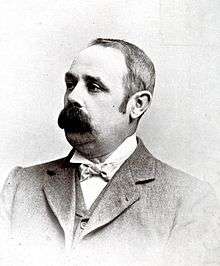National Union of Railwaymen
 | |
| Founded | 1913 |
|---|---|
| Date dissolved | 1990 |
| Merged into | National Union of Rail, Maritime and Transport Workers |
| Members | 408,900 (1945) |
| Affiliation | TUC |
| Office location | Unity House, Euston Road, London |
| Country | United Kingdom |
The National Union of Railwaymen was a trade union of railway workers in the United Kingdom.
History
The NUR was an industrial union founded in 1913 by the merger of the Amalgamated Society of Railway Servants (founded 1872), the United Pointsmen and Signalmen's Society (founded 1880) and the General Railway Workers' Union (founded 1889).[1]
The NUR represented the majority of railway workers, but not white-collar workers, who were members of the Railway Clerks' Association (founded 1897, later the Transport Salaried Staffs' Association). NUR membership was open to drivers and firemen but most chose instead to be members of the Associated Society of Locomotive Engineers and Firemen (founded 1880).
In 1914 the NUR joined forces with the National Transport Workers' Federation and Mining Federation of Great Britain to form the Triple Alliance – perhaps an unfortunate name, as the same year the Triple Entente of Britain, France and Russia and the Triple Alliance of Germany, and Austria-Hungary (albeit without Italy) went to war.
In 1919 the NUR and ASLEF jointly organised a national railway strike, which prevented a proposed wage reduction and won an eight-hour maximum working day.[2] The NUR formed Federation agreements with ASLEF in 1903[3] and 1982 but both were short-lived.
The NUR had 408,900 members in 1945, making it the fifth largest union in Britain. Its membership fell to 369,400 in 1956 and 227,800 in 1966.[4]
In 1990 the NUR merged with the National Union of Seamen to form the National Union of Rail, Maritime and Transport Workers (RMT) and ceased to exist as a separate union.
General Secretaries

Source:[5]
- 1913: James Edwin Williams
- 1916: James Henry Thomas
- 1931: Charlie Cramp
- 1933: John Marchbank
- 1943: John Benstead
- 1948: Jim Figgins
- 1953: Jim Campbell
- 1957: Sidney Greene
- 1975: Sidney Weighell
- 1983: Jimmy Knapp
Presidents
Source:[6]
- 1913: Albert Bellamy
- 1918: Charlie Cramp
- 1920: William James Abraham
- 1922: John Marchbank
- 1925: William Dobbie
- 1928: J. Gore
- 1931: William Dobbie
- 1934: Joseph Henderson
- 1937: Walter T. Griffiths
- 1939: J. H. Potts
- 1942: Frederick Burrows
- 1945: John Edward Binks
- 1948: William Tindall Potter
- 1951: Henry Franklin
- 1954: Jim Stafford
- 1957: Tom Hollywood
- 1958: Charles W. Evans
- 1961: Bill Rathbone
- 1964: Frank Donlon
- 1967: Frank Lane
- 1970: George Chambers
- 1972: Harold McRitchie
- 1975: Dave Bowman
- 1978:
- 1982: Tom Ham
- 1984: George Wakenshaw
- 1987: Alan Foster
- 1990: John Cogger
See also
References
- ↑ Raynes, 1921, page 165
- ↑ Raynes, 1921, page 269
- ↑ Raynes, 1921, page 124
- ↑ Marsh, Arthur (1979). Trade Union Handbook: A Guide and Directory to the Structure, Membership, Policy and Personnel of the British Trade Unions. Westmead, Hants.: Gower Press. p. 14. ISBN 0-566-02091-2. Retrieved 16 April 2013.
- ↑ "General Secretaries of the National Union of Railwaymen, 1913-1990", Modern Records Centre, University of Warwick
- ↑ Philip Sydney Bagwell, The National Union of Railwaymen, 1913-1963: A Half-century of Industrial Trade Unionism, p.2
Sources and further reading
- Bagwell, Philip S (1963). The Railwaymen. London: George Allen & Unwin.
- Bagwell, Philip S (1982). The Railwaymen – Volume 2: the Beeching Era and After. London: George Allen & Unwin. ISBN 0-04-331084-2.
- Bagwell, Philip. "Transport" in Chris Wrigley, ed. A History of British industrial relations, 1875-1914 (Univ of Massachusetts Press, 1982), pp 230-52.
- Griffiths, Robert (2005). Driven by Ideals. London: Associated Society of Locomotive Engineers and Firemen.
- McKillop, Norman (1950). The Lighted Flame; a History of the Associated Society of Locomotive Engineers and Firemen. London & Edinburgh: Thomas Nelson & Sons Ltd.
- Raynes, J.R. (1921). Engines and Men; the History of the Associated Society of Locomotive Engineers and Firemen. Leeds: Goodall & Suddick (1916) Ltd.
External links
| Wikimedia Commons has media related to National Union of Railwaymen. |